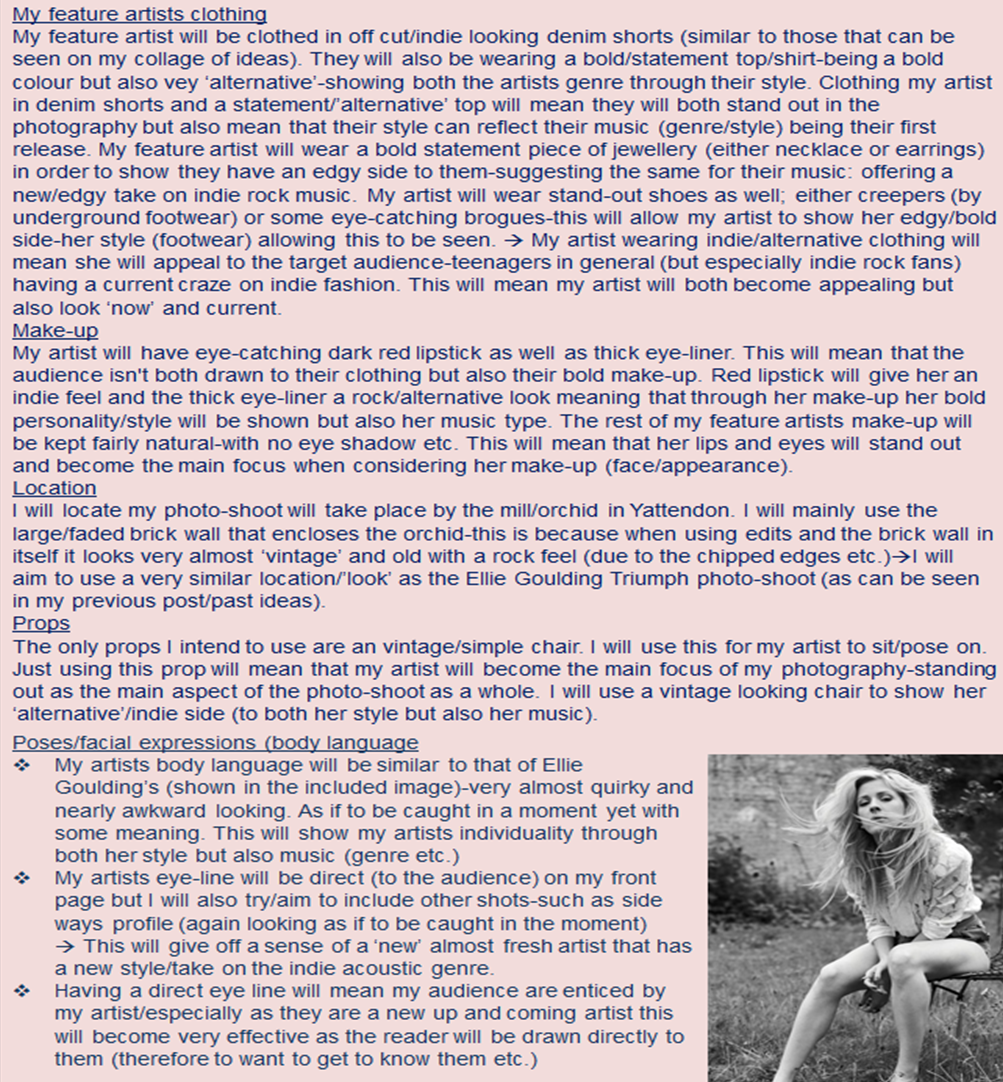Monday, 25 November 2013
What my feature article (Luna Layton) will be based around
•Where it all started?
•First up and coming single? (Producing it etc)-promoting single/style
•Inspiration? (camden life etc.)
•Highlight of career so far?-link to pull quote on facing page (feature article) also include gigs she has done and fan support.
•Reading festival performance? (meeting other acts etc.)-performing on the 'up and coming stage'
à include that the alternative sound review has done a review of Luna’s latest gig(s)-mention previous gigs she has done (sense of her music, style etc.)
à include that the alternative sound review has done a review of Luna’s latest gig(s)-mention previous gigs she has done (sense of her music, style etc.)
Friday, 22 November 2013
Wednesday, 20 November 2013
Monday, 18 November 2013
Friday, 15 November 2013
Wednesday, 13 November 2013
Monday, 11 November 2013
Friday, 8 November 2013
Wednesday, 23 October 2013
Monday, 21 October 2013
Monday, 14 October 2013
Wednesday, 2 October 2013
Research into Q magazines target audience
Mark Ellen and David Hepworth (the founders of Q) felt
that older music buyers were being ignored so they targeted their magazine at
music buyers over twenty five years old of both genders. Instead of aiming at
teenagers and young people as most other music magazines do.
The fact that the target audience is slightly older means the magazine can afford to be more expensive than if it were to be aimed at young people as the target audience they are aiming at are likely to have a greater income and be prepared to spend more on a music magazine. Having an older audience means that magazine can contain more information about the old ‘classic’ albums and music from the past decades. Having a mass audience due to its popularity the magazine could also be referred to as having a niche audience, as it is specifically aimed at only music fans.
The fact that the target audience is slightly older means the magazine can afford to be more expensive than if it were to be aimed at young people as the target audience they are aiming at are likely to have a greater income and be prepared to spend more on a music magazine. Having an older audience means that magazine can contain more information about the old ‘classic’ albums and music from the past decades. Having a mass audience due to its popularity the magazine could also be referred to as having a niche audience, as it is specifically aimed at only music fans.
v
The magazine has an review section, featuring: new releases, reissues, film and live concert reviews,
as well as radio and TV reviews.
vThe magazine is well known for compiling
lists. It has created many, for example, "The 100 Greatest albums" and "100 Greatest '100 Greatest' Lists".
vEvery other month, Q has a special edition-about musical
time, genres, or a very important/influential musician.
vEvery issue of Q has a different message on the spine.
Readers then try to work out what the message has to do with the contents of
the magazine. The spine also consist of the different artists that are featured
within the magazine-giving readers a quick and straight forward way to know if
they will enjoy the issue and make buying (choosing) the magazine more efficient.
Tuesday, 1 October 2013
Monday, 30 September 2013
Saturday, 28 September 2013
Monday, 23 September 2013
Friday, 20 September 2013
Sunday, 15 September 2013
Subscribe to:
Comments (Atom)
















































.JPG)
.JPG)